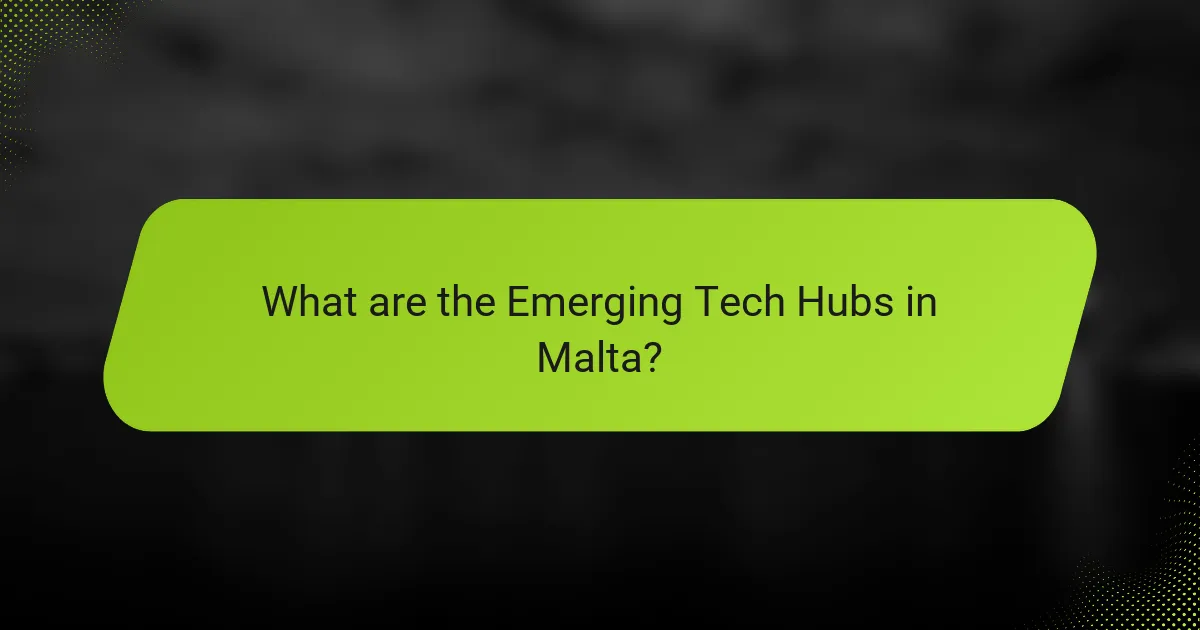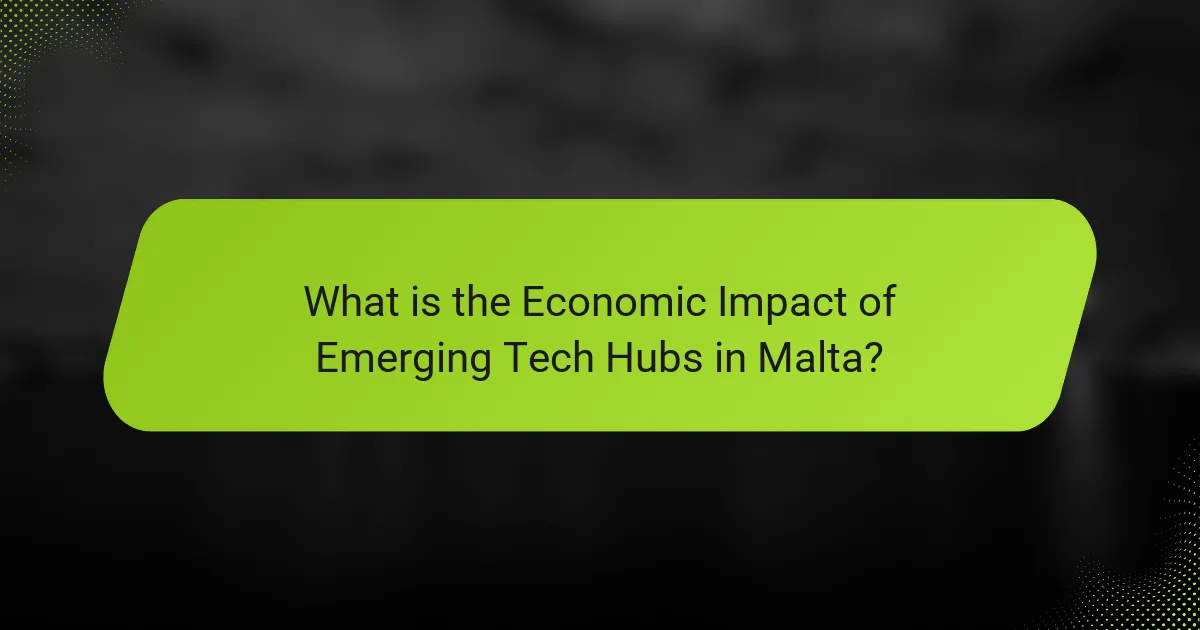
What are the Emerging Tech Hubs in Malta?
The emerging tech hubs in Malta include Smart City Malta, Valletta, and Birkirkara. Smart City Malta focuses on digital innovation and technology startups. Valletta is home to various fintech and blockchain companies. Birkirkara has a growing number of IT and software development firms. These hubs foster collaboration and innovation within the tech ecosystem. The Maltese government supports these hubs through favorable regulations and incentives. This support has attracted both local and international tech companies. As a result, Malta’s tech scene is rapidly evolving and gaining global recognition.
How did Malta become a destination for tech hubs?
Malta became a destination for tech hubs due to its favorable regulatory environment and strategic location. The Maltese government introduced attractive incentives for tech companies. These incentives included tax benefits and streamlined licensing processes. Malta’s membership in the European Union also provided access to a larger market. The country invested in digital infrastructure to support tech growth. Furthermore, a skilled workforce emerged from local universities. The combination of these factors fostered an innovative ecosystem. As a result, numerous tech companies established operations in Malta.
What historical factors contributed to Malta’s tech ecosystem?
Malta’s tech ecosystem has been shaped by several historical factors. The strategic geographical location of Malta has made it a crossroads for trade and innovation. Its history of British colonial rule established a legal framework conducive to business. The introduction of the Malta Digital Innovation Authority in 2018 promoted digital innovation and blockchain technology. Malta’s membership in the European Union since 2004 has opened access to a larger market for tech companies. Additionally, government incentives have attracted foreign investment in the tech sector. The presence of educational institutions has fostered a skilled workforce. Lastly, the growth of the iGaming industry has spurred advancements in technology and infrastructure. These factors collectively laid the foundation for Malta’s evolving tech landscape.
How has Malta’s geographical location influenced its tech industry?
Malta’s geographical location has significantly influenced its tech industry by providing strategic access to European and North African markets. Situated in the Mediterranean, Malta serves as a gateway for companies looking to operate in both Europe and Africa. This unique positioning attracts international firms seeking to establish a presence in the region.
Malta’s membership in the European Union enhances its appeal as a business hub. The country benefits from EU regulations that promote a stable and predictable business environment. Additionally, its favorable tax regime encourages tech startups and established companies alike.
The local government actively supports the tech sector through incentives and initiatives. For instance, Malta has invested in digital infrastructure to support tech growth. This includes the establishment of innovation hubs and tech parks.
Moreover, the island’s multilingual workforce is a key asset for tech firms. The diverse linguistic skills of the population facilitate communication with clients across Europe and beyond.
Overall, Malta’s geographical location, combined with supportive government policies and a skilled workforce, has created a thriving tech ecosystem.
What are the key characteristics of Malta’s tech hubs?
Malta’s tech hubs are characterized by a vibrant startup ecosystem, strong government support, and a strategic geographic location. The startup ecosystem thrives due to a growing number of incubators and accelerators. Government initiatives, such as tax incentives, encourage innovation and investment in technology. Malta’s location in the Mediterranean facilitates access to European and North African markets. The hubs also benefit from a skilled, multilingual workforce, enhancing their appeal for international businesses. Additionally, Malta’s regulatory framework is designed to foster growth in sectors like blockchain and fintech. These characteristics collectively position Malta as an attractive destination for tech companies and entrepreneurs.
What types of technologies are primarily developed in these hubs?
Emerging tech hubs in Malta primarily develop blockchain, fintech, and artificial intelligence technologies. These sectors benefit from Malta’s regulatory framework that supports innovation. Blockchain technology is significant due to Malta’s positioning as a blockchain island. Fintech companies leverage Malta’s advanced financial services ecosystem. Artificial intelligence development is fostered by collaborations between local universities and tech firms. The presence of skilled talent further enhances these technological advancements. Malta’s government actively promotes these technologies through various initiatives and incentives.
How do these hubs foster innovation and collaboration?
Emerging tech hubs in Malta foster innovation and collaboration by creating supportive ecosystems for startups and established businesses. These hubs provide access to resources such as funding, mentorship, and networking opportunities. They often host events, workshops, and hackathons that encourage knowledge sharing and idea generation. Collaborative spaces within these hubs facilitate teamwork and interaction among diverse professionals. Research indicates that environments with high interaction rates lead to increased creativity and innovation. Malta’s strategic location also attracts international talent and investment, further enhancing collaborative efforts.

Who are the Key Players in Malta’s Emerging Tech Hubs?
The key players in Malta’s emerging tech hubs include innovative startups, established tech companies, and government initiatives. Startups such as Zeta, a blockchain technology firm, are leading the charge in innovation. Established companies like Microsoft and IBM have also set up operations in Malta, contributing to the tech ecosystem. The Maltese government supports tech development through initiatives like the Malta Digital Innovation Authority. This authority regulates blockchain and digital innovation. Furthermore, educational institutions like the University of Malta foster tech talent through specialized programs. These players collectively enhance Malta’s position as a growing tech hub in Europe.
What are the major companies operating in Malta’s tech scene?
The major companies operating in Malta’s tech scene include Betsson Group, a leading online gaming operator. Another significant player is Gaming Innovation Group, which provides technology solutions for the gaming industry. Furthermore, Zimpler is a notable fintech company specializing in payment solutions. Additionally, the software development company, Exante, focuses on financial services technology. These companies contribute significantly to Malta’s reputation as a tech hub. Malta’s favorable regulatory environment supports the growth of these tech entities. The presence of these firms showcases Malta’s emerging role in the global tech landscape.
How do these companies contribute to the local economy?
These companies contribute to the local economy by creating jobs and stimulating investment. They employ a significant number of local residents, which boosts household incomes. Increased employment leads to higher consumer spending in the community. Additionally, these companies often invest in local infrastructure and services. This investment can enhance public amenities and transportation. They also foster innovation and entrepreneurship, attracting further business development. In 2021, the tech sector in Malta contributed approximately 7% to the GDP, highlighting its economic significance. Overall, the presence of these companies strengthens the local economic ecosystem.
What roles do startups play in Malta’s tech ecosystem?
Startups in Malta’s tech ecosystem drive innovation and economic growth. They create job opportunities, fostering a skilled workforce. Startups also attract foreign investment, enhancing Malta’s global competitiveness. They contribute to technological advancement through research and development initiatives. Additionally, startups enhance collaboration among industry players and educational institutions. This synergy promotes knowledge sharing and resource optimization. Furthermore, the presence of startups encourages a vibrant entrepreneurial culture, inspiring new ventures. According to the Malta Chamber of Commerce, startups significantly impact the local economy by generating revenue and increasing exports.
Who are the influential organizations supporting tech development?
The influential organizations supporting tech development include government entities, private companies, and educational institutions. In Malta, the Malta Chamber of Commerce plays a significant role in fostering innovation. The Malta Information Technology Agency (MITA) drives digital transformation initiatives. Furthermore, the University of Malta contributes through research and development programs. Private companies like Gaming Innovation Group and various startups are also key players in the tech ecosystem. These organizations collaborate to create a robust environment for technological advancement. Their collective efforts enhance Malta’s position as an emerging tech hub.
What government initiatives promote tech innovation in Malta?
The Maltese government promotes tech innovation through several initiatives. One key initiative is the Malta Digital Innovation Authority (MDIA). The MDIA aims to create a regulatory framework for innovative technologies. This includes blockchain and artificial intelligence. Another initiative is the Start in Malta program. This program provides support for startups and entrepreneurs in the tech sector. It offers financial assistance and mentorship. The government also invests in research and development through the Malta Council for Science and Technology. This council funds projects that advance technology and innovation. Lastly, the government has established the Malta Innovation Hub. This hub fosters collaboration between businesses, academia, and government to drive tech advancements. These initiatives collectively contribute to Malta’s growing reputation as a tech innovation hub.
How do educational institutions collaborate with tech hubs?
Educational institutions collaborate with tech hubs through various partnerships and initiatives. They engage in joint research projects that leverage expertise from both sectors. Many institutions offer internships and co-op programs, providing students with hands-on experience in tech environments. Tech hubs often provide resources and mentorship to students and faculty. Collaborative workshops and seminars are organized to foster innovation and knowledge exchange. Additionally, universities may develop curricula in alignment with industry needs identified by tech hubs. These collaborations enhance workforce readiness and drive economic growth in the region.

What is the Economic Impact of Emerging Tech Hubs in Malta?
Emerging tech hubs in Malta significantly boost the economy. They contribute to job creation across various sectors. The tech industry in Malta has grown substantially, with over 1,000 companies operating in the sector. This growth translates to increased foreign investment, enhancing Malta’s global competitiveness. Additionally, tech hubs foster innovation, leading to the development of new products and services. The GDP contribution from the tech sector is estimated to be around 7% and continues to rise. Furthermore, emerging tech hubs attract talent, enriching the local workforce and increasing knowledge transfer. Overall, these hubs play a crucial role in Malta’s economic landscape.
How do tech hubs contribute to Malta’s overall economy?
Tech hubs significantly contribute to Malta’s overall economy by driving innovation and attracting investment. They create job opportunities in high-demand sectors like IT and digital services. In 2022, the tech sector accounted for approximately 7% of Malta’s GDP. This growth stimulates local businesses and promotes entrepreneurship. Tech hubs also enhance Malta’s global competitiveness as a digital economy leader. They foster collaboration between startups and established companies, leading to technological advancements. Additionally, these hubs attract international talent, further enriching the local workforce. Overall, tech hubs play a crucial role in Malta’s economic development and diversification.
What are the job creation statistics linked to tech hubs?
Tech hubs significantly contribute to job creation. For instance, a report by the European Commission states that tech hubs can create up to 1.5 million jobs in Europe by 2025. In Malta, tech hubs have led to a 20% increase in tech-related employment over the past five years. This growth is attributed to the rise of startups and established companies in these regions. Additionally, a survey by the Malta Chamber of Commerce reported that 60% of tech firms plan to expand their workforce in the next year. This trend indicates a robust demand for skilled professionals in the tech sector.
How does the tech industry affect other sectors in Malta?
The tech industry in Malta significantly influences other sectors by driving economic growth and innovation. It fosters collaboration with finance, gaming, and tourism sectors. For instance, tech solutions enhance operational efficiency in financial services. The gaming industry benefits from advancements in software development and cybersecurity. Additionally, tourism leverages technology for improved customer experiences and marketing strategies. According to the Malta Chamber of Commerce, tech-related sectors contributed approximately 7% to Malta’s GDP in 2021. This demonstrates the tech industry’s pivotal role in the overall economic landscape of Malta.
What challenges do emerging tech hubs face in Malta?
Emerging tech hubs in Malta face several challenges. Limited access to funding is a significant issue. Many startups struggle to secure investment from local sources. Regulatory hurdles also impede growth. Complex compliance requirements can deter new businesses. Additionally, there is a skills shortage in the tech workforce. This gap affects the ability to attract and retain talent. Infrastructure limitations can hinder operational efficiency. Finally, competition from larger tech markets poses a threat to emerging hubs. These challenges collectively impact the growth potential of Malta’s tech ecosystem.
How do regulatory issues impact tech development?
Regulatory issues significantly impact tech development by shaping the operational landscape for companies. Regulations can dictate compliance requirements, influencing the pace of innovation. Strict regulations may slow down product launches due to lengthy approval processes. Conversely, clear regulatory frameworks can foster growth by providing certainty for investors. For example, Malta’s proactive approach to blockchain regulations has attracted numerous tech startups. This has positioned Malta as a hub for emerging technologies. Thus, the nature of regulatory environments directly affects the success and speed of tech advancements.
What are the common barriers to growth for tech startups?
Common barriers to growth for tech startups include limited access to funding, talent shortages, and regulatory challenges. Limited access to funding restricts the ability to scale operations and invest in innovation. According to a report by the European Investment Bank, 40% of startups cite financing as a major obstacle. Talent shortages hinder the recruitment of skilled professionals necessary for development. Additionally, regulatory challenges can create compliance burdens that slow down growth. These barriers collectively impact the ability of tech startups to thrive in competitive markets.
What are the future prospects for Malta’s emerging tech hubs?
Malta’s emerging tech hubs are expected to experience significant growth in the coming years. The government is actively promoting innovation through favorable policies. Investment in digital infrastructure is increasing, attracting both local and foreign companies. The presence of a skilled workforce enhances the tech ecosystem. Malta’s strategic location in the Mediterranean serves as a gateway to Europe and North Africa. Initiatives like the Malta Digital Innovation Authority support blockchain and AI development. The tech sector’s contribution to GDP is projected to rise, further boosting the economy. These factors collectively indicate a promising future for Malta’s tech hubs.
How can Malta enhance its position as a tech hub in Europe?
Malta can enhance its position as a tech hub in Europe by fostering a supportive regulatory environment. This includes simplifying the process for tech startups to register and operate. Investment in digital infrastructure is crucial. High-speed internet and advanced telecommunication networks will attract tech companies.
Collaboration between educational institutions and the tech industry is essential. This can help develop a skilled workforce tailored to market needs. Malta should also promote innovation through grants and funding for tech initiatives. Hosting international tech events can increase visibility and attract global talent.
Furthermore, establishing partnerships with established tech companies can create knowledge transfer opportunities. This will help local firms innovate and grow. By implementing these strategies, Malta can strengthen its tech ecosystem and appeal to international businesses.
What trends are likely to shape the future of tech in Malta?
The future of tech in Malta is likely to be shaped by advancements in blockchain technology, artificial intelligence, and cybersecurity. Blockchain technology is gaining traction due to Malta’s favorable regulatory environment. The country has established itself as a hub for blockchain startups and cryptocurrency exchanges. Artificial intelligence is expected to play a significant role in various sectors, including finance and healthcare. The government is investing in AI research and development initiatives. Cybersecurity is becoming increasingly important as digital transformation accelerates. With the rise in cyber threats, Malta is focusing on enhancing its cybersecurity infrastructure. These trends are supported by Malta’s strategic location and skilled workforce, fostering innovation and attracting global tech companies.
What best practices can be adopted by emerging tech hubs in Malta?
Emerging tech hubs in Malta can adopt several best practices to enhance their growth and sustainability. First, fostering collaboration between startups, established companies, and educational institutions is crucial. This collaboration can lead to innovation and skill development. Second, creating a supportive regulatory environment encourages investment and entrepreneurship. Malta’s government has initiatives to streamline processes for tech startups. Third, investing in talent development through training programs can equip the workforce with necessary tech skills. Research indicates that countries with strong tech education see higher innovation rates. Fourth, promoting networking events and conferences can facilitate knowledge sharing and partnerships. Lastly, leveraging Malta’s strategic location and digital infrastructure can attract international businesses. These practices can significantly contribute to the success of tech hubs in Malta.
Emerging Tech Hubs in Malta represent a dynamic ecosystem characterized by innovation, government support, and strategic geographic advantages. Key locations such as Smart City Malta, Valletta, and Birkirkara foster collaboration among startups and established companies, particularly in sectors like blockchain, fintech, and artificial intelligence. The article explores the historical factors that shaped Malta’s tech landscape, the role of influential organizations, and the economic impact of these hubs, including job creation and investment attraction. Additionally, it addresses challenges faced by the tech industry and outlines future prospects for growth and sustainability in Malta’s emerging tech scene.
